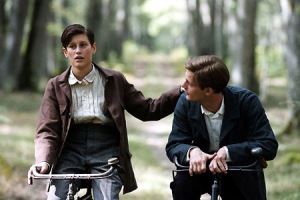I was unable to love this book, though so many reviews—by people I respect!—were so very positive. Julian Barnes hailed it as a classic and a true vision of adolescent romance, and there were several other reviews which convinced me to try it. The narrator is a French school boy living in a remote country village in central France, in the late 1890’s. His parents run the school, and he describes the small routines of the place—the cold, the snow, the church bells, the village cafe. Perhaps it had to do with the translation, but everything seemed very alien to me—odd, abnormal, unfamiliar. Of course, a small French village in the 1890’s IS an alien place to me, but somehow, other writers of the time—Collette, Conrad, Kipling—coming from stranger places still managed to write in such a way that I understood their world. Not so Mr. Fournier. Perhaps it has to do with the adolescent business, that his concerns and obsessions simply are not fascinating to me.
Though there is one engaging scene when the narrator rhapsodizes about a bicycle ride: “Plunging down from the top of a hill in the depth s of the countryside, discovering the distant road ahead like a bird on the wing and watching it open and blossom around you, dashing through a village and taking it in with a single glance…So far only in dreams had I experienced such delightful, airy motion….”
s of the countryside, discovering the distant road ahead like a bird on the wing and watching it open and blossom around you, dashing through a village and taking it in with a single glance…So far only in dreams had I experienced such delightful, airy motion….”
The boy who comes into our narrator’s life and transforms it— Augustin Meaulnes, AKA le grand Meaulnes–becomes a leader of the lads in their games and events, but the plot suddenly takes a whimsical turn: without telling anyone, Meaulnes sets off on an ill considered journey, rushing off to meet our narrator’s grandparents, who are arriving at a distant train station. He borrows a horse and cart from a farmer, and heads off without the slightest idea as to where the station is. High spirits? Or imbecility? Getting lost, losing the horse, he stumbles about and eventually finds himself in a magical chateau where a fabulous wedding party is taking place, in which he takes part. He is transfixed by the shining vision of a beautiful girl, he talks to her, falls in love, there is a picnic by a lake, everything is charming and like a dream—and then, it ends, tragedy, the bride has run away, the groom is beside himself, everyone leaves. Meaulnes somehow makes his way back to the school, but life will never be the same for him, he cares for nothing but finding the chateau and the girl again. He and the narrator make a map, which is stolen by another boy, other things happen, including gypsies—but, zut alors, one of the gypsies turns out to be the distraught bridegroom of the lost chateau. I don’t know, I just lost interest at this point. Especially when the other gypsy steals a bunch of chickens from the villagers. I read on, but without any great enthusiasm. The magical chateau business was rather nice, but the rest of the book did not measure up to it.
My dad always used to say, ‘when a book and a head collide, and one sounds hollow, is it ALWAYS the book?’ (a quote, I find, by one Georg Lichtenberg). So very likely it is a failing in me, that I can’t sympathize with the romantic notions. Instead of ineffable enchantment, I see silly incompetence. This has ever been my failing—probably a result of being the one that has to clean up the mess after the grand souls have finished wrecking the place.
Which is not to say that you shouldn’t try it!